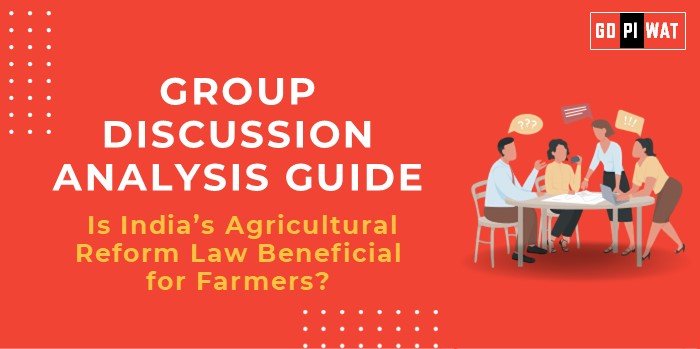📋 Group Discussion (GD) Analysis Guide
📝 Topic: Is India’s Agricultural Reform Law Beneficial for Farmers?
🌐 Introduction
🌾 Opening Context: Agriculture remains the backbone of India’s economy, providing livelihoods to nearly 58% of its population. The Agricultural Reform Laws aim to modernize this critical sector but have sparked nationwide debate.
📜 Topic Background: Introduced in 2020, these laws intended to deregulate agricultural markets and provide farmers with expanded opportunities. However, they have faced resistance due to fears of diminished protections for small farmers and the collapse of the Agricultural Produce Market Committee (APMC) system.
📊 Quick Facts & Key Statistics
- 👩🌾 Farmers in India: Approximately 58% of India’s population relies on agriculture for their livelihood.
- 📈 Contribution to GDP: Agriculture contributes about 20% to India’s GDP (2024).
- 🚨 Protests: In December 2024, hundreds of farmers clashed with police near the Shambhu border, demanding guaranteed minimum crop prices.
- 🏢 APMC Coverage: The APMC system regulates agricultural markets, providing structured marketplaces across various states.
🎯 Stakeholders and Their Roles
- 👨🌾 Farmers: Central stakeholders; seek fair prices and government intervention for stability.
- 🏛️ Government: Proposes reforms to liberalize markets and attract private investments.
- 💼 Private Corporations: Interested in streamlining supply chains but face mistrust from small farmers.
- 🏢 APMCs: Serve as intermediaries, ensuring minimum price guarantees and structured trade.
- 🍎 Consumers: Indirectly benefit from reduced prices and improved supply chains.
🏆 Achievements and Challenges
🔑 Achievements
- 📈 Expanded Market Access: Farmers can bypass middlemen, accessing better pricing directly.
- 💰 Private Investments: Attracted funding to improve agricultural infrastructure.
- 📖 Case Study: Haryana’s agri-tech pilot project reduced wastage by 20%, benefiting both producers and buyers.
⚠️ Challenges
- ⚖️ Corporate Dominance: Persistent fears of monopolies determining market prices.
- 🚨 Protests: Farmer movements demand legislative guarantees for minimum support prices (MSP).
- 🌍 Global Comparison: The European Union’s Common Agricultural Policy balances market freedom with safety nets for farmers.
💡 Effective Discussion Approaches
🌟 Opening Approaches
- 📊 Highlight economic scale: “Agriculture contributes 20% to GDP, underscoring its critical role in the economy.”
- 🌍 Reference global frameworks: “Compare India’s reforms with international policies like the US Farm Bill and EU subsidies.”
🎯 Counter-Argument Handling
- 📋 Cite successful examples: “APMC reforms in Maharashtra have demonstrated improvements in farmer incomes.”
- 🔄 Acknowledge mistrust: “While private investment is key, transparency and safeguards like MSP are vital.”
📊 Strategic Analysis of Strengths & Weaknesses
🔍 SWOT Analysis
- 💪 Strengths: Expanded market access, increased efficiency, private investment potential.
- 📉 Weaknesses: Unequal bargaining power, infrastructure gaps, farmer mistrust.
- 🌟 Opportunities: Boosting exports, integrating digital platforms for trade.
- ⚠️ Threats: Large-scale protests, potential monopolization, political instability.
🗣️ Structured Arguments for Discussion
- ✅ Supporting Stance: “The reforms empower farmers by providing them with direct market access and eliminating inefficiencies.”
- ❌ Opposing Stance: “These laws risk marginalizing small farmers without adequate safeguards like MSP guarantees.”
- ⚖️ Balanced Perspective: “While the reforms aim to modernize agriculture, their success depends on addressing small farmers’ concerns and ensuring equitable growth.”
📚 Connecting with B-School Applications
- 🧠 Real-World Applications: Study the impact of policy changes on rural economies, supply chain models, and CSR initiatives.
- 📋 Sample Interview Questions:
- 🤔 “What measures can prevent market exploitation post-agricultural reforms?”
- 🌾 “Discuss how agri-tech solutions could enhance farmer incomes.”
- 💡 Insights for Students: Explore agricultural policy as a case study in stakeholder management, public-private partnerships, and economic strategy.


